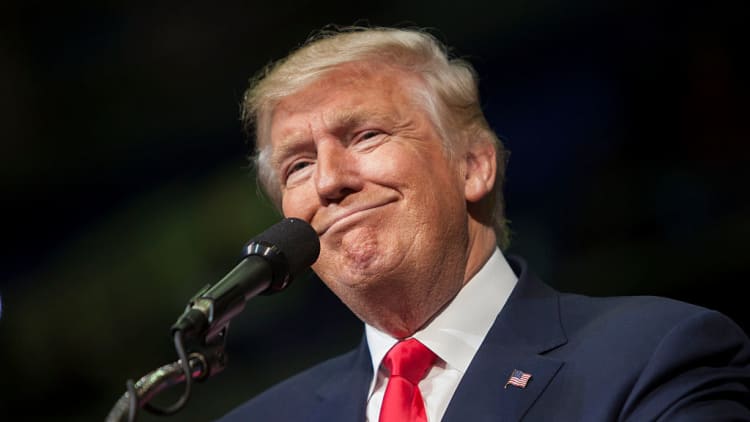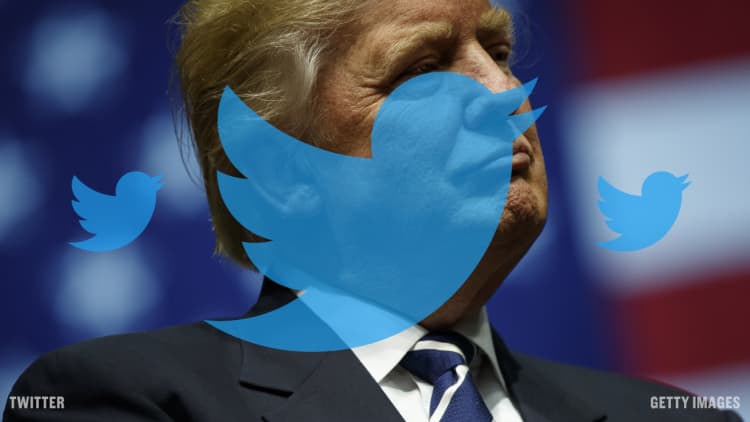
At the year's biggest gathering of economists this past weekend, an audience member stood up and asked a question that was likely on the mind of many of the 13,000 at the conference: Will top economists go to work for the Trump administration?
Alan Krueger, a Princeton professor who headed President Barack Obama's Council of Economic Advisors, suggested it was the wrong question to ask. "I worry more about the demand side than the supply side,'' he quipped. That is, it's not whether Donald Trump can get economists to work for him; it's whether he wants economists to work for him at all.
So far, it's anyone's guess.
In the hallways and panels of the American Economic Association annual conference in Chicago, there was much discussion both about the economics of the Trump administration (they did not get good reviews) and the economists. "Have you met anyone here working with them?" was a common question this reporter both received and asked. The answer was always no.
So far, just one academic economist has been named to the administration. Peter Navarro, the University of California Irvine economics professor, will head a newly created White House National Trade Council. CNBC contributor Larry Kudlow, former Bear Stearns economist David Malpass and the Heritage Foundation's Stephen Moore have all worked closely with Trump to design his economic plans. Gary Cohn, the former Goldman Sachs president, whose career has been almost entirely on Wall Street, has been named director of the National Economic Council.
None, however, would be considered by the AEA group as an academic economist, as in one with a Ph.D., employed currently at an institution of higher learning who publishes peer-reviewed research papers. The key, said several participants, is an economist who leaves academia to go to work in politics and ultimately returns to academia — that is, someone subject to the scrutiny of his or her profession and his or her peers, rather than one ultimately with political or business allegiances.
"Treasury has always been more beholden to Wall Street and Commerce to business," said one government academic economist who asked not to be named. "We're not really beholden to anyone."
Underscoring the need was Trump's colossal economic error at yesterday press conference. He wrongly said that 96 million Americans are out of the labor force and looking for work. There are indeed 96 million out of the labor force. But most are retired, going to school, or sick or disabled. Something like 5 million want to work, and perhaps another 10 million are unemployed or underemployed.
It may be that the Trump administration simply hasn't gotten around to finding or naming its economists. On the podium with Krueger was Glenn Hubbard, dean of the Columbia Business School who headed the Council of Economic Advisers in the Bush administration. "I think the president can get any economist he wants," Hubbard said.
Yet that stands in contrast to the then-incoming Obama administration. With the country's economy in crisis, then-President-elect Barack Obama rolled out his economic team in November 2008, including former New York Fed President Timothy Geithner as Treasury Secretary, Christina Romer to head the CEA and Larry Summers to head the National Economic Council. Both Romer and Summers were highly respected economists (at least by the group who gathers at the AEA) with Ph.D.s.
But it could also be that the incoming Trump administration views such economists with the same anti-elitist antipathy that has characterized other selections. "We've seen a lot of atypical appointments which don't put much weight on expertise or understanding or support for the agencies to which they've been nominated," Krueger said.
As a profession, the public perception of economists could be near a nadir. They failed to foresee the financial crisis; the prescriptions for returning growth to previous levels haven't panned out and their explanations for why growth hasn't rebounded is anything but inspiring. It's closer to depressing.
A prevailing view in economics right now is that economic growth has permanently downshifted due to lower population growth, the aging of the population and a decline in productivity. The downbeat outlook of Northwestern economics professor Robert Gordon has increasingly become conventional wisdom. His book "The Rise and Fall of American Growth" argues that the best inventions, like running water, electricity and the combustion engine, are behind the human race and have already provided the bulk of their boost to productivity growth. The latest computing inventions, Gordon says, have only limited upside for productivity and may also have passed. His forecast is for only muted productivity growth in the years ahead, which means muted overall economic growth.
Contrast those views with those of Trump with his slogan "Make America Great Again" and who suggests his tax cuts, trade reforms, deregulation and infrastructure spending plans can boost growth to 3, 4 or even 5 percent. Most economists currently believe the potential of the economy is somewhere below 2 percent. Some economists agreed that parts of Trump's plan could boost growth, but many say the president-elect should be ecstatic to squeeze an extra 1 percentage point out of growth. Many forecast less than half a percentage point of additional growth from Trump's policies.
The academic economists argue that they have much to offer and that Trump would make a mistake by not including them. There are simple things, like forecasting the budget, which requires making related forecasts between economic growth, employment, inflation and economic potential.
And there is designing policy that uses the latest research that tries to understand how people really react to incentives, and building those incentives into the policy. That's not to mention understanding the complicated econometrics that help measure economic policy and forecast its effects.
Interestingly, Glenn Hubbard offers that designing policy is not the most important value economists add. "That's actually not why you need economists," Hubbard said at the Chicago panel. He showed a picture of the burning World Trade Center towers and said, "You need economists because things happen and somebody needs to talk about trade-offs." The picture of the burning towers was effectively code that all in the room understood implicitly to stand for shocks that unexpectedly hit economies and require policy responses, sometimes immediate and critical.
Hubbard offers that economists can talk a new administration through relationships between policy, effects of shocks, budget deficits and the relationship of monetary and fiscal policy. "Math has a habit of not going away," Hubbard said.
WATCH: Trump’s tweets can cost a company billions of dollars. Here’s how...



